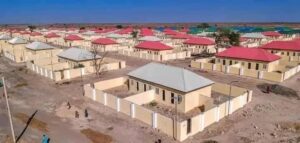Environment: Borno laments rising temperature, develops climate change adaptation
The Borno State Government said that rising temperature and changing rainfall patterns have ravaged the entire Chad Basin, destroyed livelihoods, such as farming and fishing and stoked conflicts.
Besides, it has developed strategic policy to tackle the increasing challenge of climate change, which has affected food security and driving forces behind the large number of internally displaced persons within the state.
State’s Commissioner for Environment, Terima Saleh, who spoke at the multi-stakeholder workshop to launch the Climate Resilience Plan in Maiduguri, said the state is ready to implement an effective strategy for combating climate change.
Saleh said, “We are vulnerable to the effects of climate change. This made the government to bring together state actors, civil societies, development partners and the media to develop a coordinated response to changing climate patterns.”
The Director, Centre for Arid Zone Studies of the University of Maiduguri, Prof. Dan Gwari, laid out scientific evidence on the impacts of climate change in the state and measures to protect farmers from its effects.
Gwari argued that developing an effective toolbox for climate smart agriculture is imperative for expanding agricultural yield, adapting to climatic conditions and reducing emissions of harmful greenhouse gases, as well as other environmental pollution.
Contributing, a climate change expert, Huzi Mshelia listed the prerequisites of developing a state-level action plan, which include studies to understand its impacts, assessment of the vulnerability of the ecology and economy of the state.
He said the plan must be customised to the needs of the state government, development partners, as well as integrated with state and national development plans.
Another speaker, Dr. Yakaka Maina, of the Food and Agricultural Organisation (FAO), called on the participants to develop a Climate Smart Profile and Investment Plans for Borno, Adamawa and Yobe States.
She urged stakeholders to collaborate with the United Nations to ensure that the response plan is well coordinated and effective to meet the yearnings and aspirations of the affected states in the Northern East Region.
On her part, Head, Green and Digital Economy, European Union, Inga Stefanowicz, said the implementation of the strategy would improve sub-national response to climate change and contribute significantly to solving the food insecurity problem that affects 25 million people.
The Executive Secretary, State Agency for Coordination of Sustainable Development and Humanitarian Response, Bunu Monguno, expressed joy over the timeliness of the plan, saying, “it is a key pillar in the Borno 25-year plan, tagged Strategic Transformative Initiatives.”
The Borno State climate change project is funded by the European Union and implemented by the International Centre for Energy, Environment and Development (ICEED), Development Exchange Centre (DEC) and Local Communities Development Initiative (LOCDIN).




